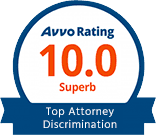
Maryland ADA Compliance Attorneys
Representing Disabled Workers Throughout Maryland
Regardless of your job, your career is an integral part of your life. Whether you're a hardworking professional eager to climb the corporate ladder or someone content with a day job that allows plenty of time for hobbies, your livelihood is key to economic security and personal fulfillment.
Our Maryland employment lawyers understand how workplace discrimination can degrade workers' confidence, identity, and self-worth. For disabled individuals, the right to work in a non-discriminatory environment is even more complex. From addressing unconscious biases in the workplace to holding employers accountable for unethical behavior, The Law Office of Andrew M. Dansicker, LLC has the legal knowledge needed to protect your rights.
In Maryland, it’s crucial to understand the specific protections and resources available to disabled workers. The state not only follows federal ADA guidelines but also has its own set of regulations aimed at ensuring workplace equity. Our team remains updated on these legal frameworks, guaranteeing informed legal advice for our clients. Moreover, Maryland’s commitment to supporting disabled employees is evident in various state-level initiatives that promote inclusive employment practices.
Facing disability discrimination at work? Contact us online to discuss your case with a skilled ADA violations attorney in Maryland.
Americans with Disabilities Act of 1990 (ADA)
The Americans with Disabilities Act (ADA) is a federal law that prohibits discrimination against individuals with disabilities in various aspects of public life, including employment. The ADA was enacted to ensure disabled individuals can access equal employment opportunities, public accommodations, transportation, and more.
In employment law, the ADA protects disabled employees from discrimination by requiring employers to provide reasonable accommodations to qualified individuals with disabilities unless doing so would impose an undue burden on the company as a whole.
The scope of the ADA extends beyond just employment, impacting how public services and facilities interact with disabled individuals. This comprehensive approach promotes inclusivity and ensures that everyone, regardless of disability, can participate fully in society. Our role as ADA lawyers involves not only addressing issues within the workplace but also ensuring these broader rights are observed and upheld. By fostering an environment of understanding and cooperation, we aim to bridge any gaps that may exist between legal theory and real-world practice, thus championing the rights of disabled individuals across Maryland.
What Constitutes a Reasonable Accommodation?
Reasonable accommodations help disabled workers perform essential job functions effectively. Under the ADA, a “reasonable accommodation” is defined as any modification or adjustment to the workplace that enables a disabled employee to perform the essential functions of their job.
Consider these common examples of reasonable accommodations in the workplace:
- Assistive technologies: This may include specialized computer software, screen readers, voice recognition software, or other assistive devices that help individuals with visual impairments, hearing loss, or mobility limitations perform their job tasks.
- Flexible scheduling: Employers may allow employees to have flexible working hours or part-time schedules to accommodate medical appointments, therapy sessions, or rest periods due to a disability.
- Modifications to physical environment: Adjustments to the physical workspace, such as installing ramps, widening doorways, or providing accessible bathrooms, can make the workplace more accessible for individuals with mobility impairments.
- Job restructuring: Employers may reassign marginal job tasks to other employees or modify job responsibilities to accommodate an individual's disability while still ensuring that the essential functions of the job are performed.
- Telework or remote work: In certain circumstances, allowing employees to work remotely can be a reasonable accommodation for individuals with disabilities that limit their ability to commute or work in a traditional office setting.
Implementing these accommodations not only complies with legal requirements but also fosters a more inclusive and productive work environment. Employers who actively engage in dialogue with their employees to assess unique needs contribute positively to workplace morale and efficiency. Proactive accommodation strategies can significantly reduce absenteeism and turnover, as satisfied employees are more likely to remain loyal and dedicated. Addressing the diverse needs of the workforce creatively and conscientiously is pivotal in promoting a progressive and adaptable business culture.
How an ADA Compliance Lawyer in Maryland Can Help
Many workers reach out only after months of frustration, unclear about what an attorney actually does in an ADA case. When you contact us, we start by listening carefully to your story and reviewing documents such as emails, performance reviews, and any prior accommodation requests. From there, we explain how federal law and Maryland law intersect in your situation, including how agencies and courts such as the U.S. District Court for the District of Maryland may view your claims. This early evaluation helps you decide whether to move forward with an administrative charge, a lawsuit, or a different strategy.
We then work with you to develop a clear plan for asserting your rights, whether that means drafting a detailed accommodation request, communicating with your employer, or preparing a charge for the EEOC or Maryland Commission on Civil Rights. As a disability rights attorney Maryland workers can turn to for guidance, we also help you weigh the practical impact of each option on your current job, your long-term career, and your health. Throughout the process, we keep you informed about timelines, potential next steps, and what to expect if your case proceeds to mediation, settlement discussions, or litigation.
Procedures for Addressing ADA Violations in Maryland
Understanding the process for addressing ADA violations in Maryland is crucial for safeguarding your rights. The initial step involves documenting any instances of discrimination or failure by an employer to provide reasonable accommodations. Records of these events are essential when filing a complaint with the Equal Employment Opportunity Commission (EEOC) or the Maryland Commission on Civil Rights (MCCR).
Once a complaint is lodged, the respective agency will investigate the claims. This may involve reviewing employment records, conducting interviews, and collaborating with legal representatives. Our firm is dedicated to guiding clients through this intricate process, ensuring all necessary documentation is thorough and submitted promptly. Our objective is to facilitate a fair and comprehensive investigation by highlighting relevant facts and legal precedents that support our clients' cases.
Understanding Maryland's Commitment to Disability Rights
Maryland has taken significant strides in promoting disability rights through legislation and community initiatives. The state adheres to both federal laws like the ADA and further enforces regulations through local statutes designed to protect disabled employees. These efforts ensure that individuals with disabilities have equitable access to employment, public accommodations, and services.
At The Law Office of Andrew M. Dansicker, we remain deeply committed to upholding these rights. By engaging with local authorities, employers, and advocacy groups, we strive to create a supportive environment for disabled workers. Our practice not only involves legal representation but also involves active participation in educating employers on compliance and best practices, helping to bridge the gap between legal obligations and practical, inclusive work environments. This comprehensive approach to disability rights signifies Maryland's forward-thinking stance and dedication to fostering an inclusive community.
5 Examples of Disability Discrimination at Work
In Maryland, disability discrimination can manifest in various ways. Some common examples of disability discrimination include (but aren’t limited to):
- Refusal to hire – Employers may unlawfully reject qualified candidates with disabilities based on stereotypes or assumptions about their job abilities.
- Wrongful termination or demotion – Unlawfully firing or demoting an employee because of their disability, even if they are qualified and capable of performing the essential job functions.
- Denying reasonable accommodations – Failing to provide necessary accommodations that would enable a disabled employee to perform their job effectively unless doing so would cause undue hardship.
- Harassment – Subjecting an employee to derogatory comments, offensive jokes, or other forms of harassment based on their disability.
- Failure to promote – Denying disabled employees opportunities for advancement or promotion solely based on their disability.
A thorough understanding of these forms of discrimination is essential for both employees and employers. Employees should be aware of their rights and the available legal avenues to address grievances effectively.
Employers, on the other hand, must ensure that their policies and workplace culture do not inadvertently perpetuate discriminatory practices. Our role involves not just representation but also education, helping both parties adopt practices that align with both legal standards and ethical considerations. By maintaining an open channel of communication, we aim to facilitate environments where diversity is respected and valued.
Frequently Asked Questions
How Do I Know If I Need an ADA Attorney?
Determining the need for an ADA attorney involves evaluating your current situation regarding workplace accommodations, discrimination, or accessibility challenges. If you are uncertain about whether you are receiving fair treatment or accommodations consistent with the ADA standards, consulting an attorney is advisable. They can provide insight into the legal protections available and help determine if your rights have been violated.
Hiring an ADA attorney is particularly beneficial if you have already attempted to resolve issues internally with your employer without success. An attorney can guide you through the complaint filing process with the EEOC or MCCR, ensuring all submissions are accurate and reflective of your experiences. Additionally, they can represent you in negotiations or legal proceedings, advocating for your rights and fair treatment under the law. At The Law Office of Andrew M. Dansicker, we prioritize client education and empowerment, equipping you with the knowledge and resources needed to navigate your situation effectively.
What Can I Expect from the ADA Grievance Process in Maryland?
The ADA grievance process in Maryland is designed to address discrimination complaints efficiently and fairly. Initially, you will need to collect all relevant documents and evidence pertaining to your case, such as communication with your employer regarding your accommodation requests. Once your documentation is complete, a complaint can be filed with the EEOC or MCCR, initiating an investigation into your claims.
During this stage, agencies will evaluate the merit of your complaint, which may include interviews and evidence assessments. If they find sufficient grounds, mediation or legal action may follow to resolve the issue. Throughout this process, having legal representation from an ADA attorney ensures that your rights are adequately asserted and defended. The Law Office of Andrew M. Dansicker offers dedicated support, guiding you through each step of the grievance process to seek rightful remedies and accommodations within your workplace.
How Does Maryland Support Disabled Workers Beyond the ADA?
Maryland actively supports disabled workers beyond federal ADA mandates through state-specific initiatives and resources. These efforts include programs aimed at enhancing job placement and retention for individuals with disabilities. The state's Division of Rehabilitation Services (DORS) provides services such as vocational training, career counseling, and employment resources, tailored to improve opportunities for disabled individuals.
Additionally, Maryland enacts stringent non-discrimination laws that further protect disabled employees, reinforcing their right to equal opportunities. Participating in these programs can provide disabled workers with essential tools and support systems to succeed professionally. At The Law Office of Andrew M. Dansicker, we emphasize the importance of not only understanding but also leveraging these state resources to complement our legal advocacy, helping clients achieve meaningful and sustainable employment outcomes.


Meet Our Team
Work With an Experienced Team That Cares

Why Choose Us?
We're the Right Firm for You!
-
Successful History & Respected in Their Field
-
Experience Representing Employees & Employers
-
After Hours & Weekend Meetings

Opinions That Matter Most
Our Client Reviews
-
"He took the time to explain the legal process in a way that made sense and shared his knowledge with kindness"It's not often you come across a lawyer who truly has your best interests at heartJennifer B.
-
"Andrew Dansicker is a great lawyer."He took my case--which many rejected.Christopher R.
-
"I highly recommend Andrew for any employment law case."Andrew was able to help me with a very difficult and complicated employment law matter.Trevor Y.
-
"Andreas' commitment to achieving the best possible outcomes makes them an invaluable resource."Former Client
-
"Andrew M. Dansicker was the only attorney that took the time to listen to me."
-
"At no point throughout our communication did I feel rushed and/or forgotten about."
-
"I feel VERY lucky!"Very grateful to find a fair and compassionate lawyer like him. Would definitely recommend to anyone in search of an employment lawyer!Shahbano S.
-
"Andreas Lundstedt took a very difficult case and absolutely nailed the outcome. His persistence, professionalism, and knowledge makes him stand out from the rest in his profession. The settlement received was 25% more than anticipated due to his tenacity a"Andreas Lundstedt took a very difficult case and absolutely nailed the outcome. His persistence, professionalism, and knowledge makes him stand out from the rest in his profession. The settlement received was 25% more than anticipated due to his tenacity aFormer Client














